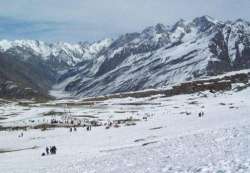After Rohtang, focus now on Shinku La tunnel amid tension in Himalayas
Amid the heightened border tension with both China and Pakistan in the Himalayas, road infrastructure projects have been given a push with completion of a marvel of engineering motorways -- the Rohtang Pass highway tunnel.

Amid the heightened border tension with both China and Pakistan in the Himalayas, road infrastructure projects have been given a push with completion of a marvel of engineering motorways -- the Rohtang Pass highway tunnel.
Officials say the focus now is on constructing the strategic 13.5-km-long Shinku La tunnel, the shortest, safer and the third alternative corridor for the armed forces for forward areas of Union Territory of Ladakh.
Experts told IANS the 9.2 km-long horseshoe-shaped single-tube, two-lane tunnel -- the world's longest motorable tunnel at over 3,000 metre above the sea level -- is a key step in the Defence Ministry's attempt to make the 475-km Manali-Keylong-Leh highway, used mainly by the armed forces to reach forward areas in Ladakh bordering China and Pakistan, motorable round-the-year.
The Rohtang tunnel -- a dream of former Prime Minister Atal Bihari Vajpayee and named after him posthumously -- is going to be inaugurated by Prime Minister Narendra Modi in his day-long visit on October 3.
The tunnel has been completed after 10 years of sheer hard work by the Border Roads Organisation (BRO) with an outlay of over Rs 3,200 crore.
"The Rohtang tunnel alone is not enough to provide the Manali-Keylong-Leh axis an all-weather link as the tunnel is going to help only civilians of Keylong," an official of the BRO, which constructs roads along the international border, told IANS.
"Other three high-altitude mountain passes that lie between Keylong and Leh still remain snowbound for at least six months in a year that make the highway totally standstill," he said.
According to the official, the all-weather road to forward areas of requires more tunnels like Rohtang Pass, either at Shinku La or at least three passes located on the original 475-km Manali-Leh road for round-the-year connectivity.
From Keylong, the district headquarters of Lahaul-Spiti, the road travels further to Leh via Darcha, some 170 km from Manali.
From Darcha, where the BRO has just completed the 360-m long longest steel truss bridge, one road bifurcates towards Shinku La (pass), the shortest route that traversing the remote Zanskar region towards Padum, some 30 km from Leh, and another towards the windy Manali-Leh highway.
The 297-km long Darcha-Nimmu-Padum road has been identified as the third strategic alternative to Ladakh in wake of the threat from Pakistan and China. The double lane road is under construction and likely to be completed by 2023, officials said.
The BRO is also studying the feasibility of constructing a tunnel beneath the 13.5-km-long snow avalanche-prone Shinku La like the Rohtang tunnel to avoid the majestic pass.
"The tunnel beneath Shinku La will further drastically reduce the distance between Manali and Leh," an official told IANS.
The Manali-Leh route is 475 km, while the Manali-Darcha-Padum-Leh road is 444 km.
Currently, the National Highways and Infrastructure Development Corp Ltd is preparing the detailed project report of the Shinku La tunnel that will link Himachal Pradesh with Ladakh.
Officials admit with the completion of the Rohtang Pass tunnel, the focus of the Indian government now shifts towards the construction of the Shinku La tunnel owing to the strategic significance of the third route to Ladakh, a shorter one.
Currently, the troop movement towards Ladakh is by two routes -- the 434-km Srinagar-Kargil-Leh via Zojila Pass and the 475-km Manali-Leh that passes through the Rohtang Pass. But they remain cut off from the rest of the country for over six months due to heavy snowfall.
For Kargil, the troop movement from Manali is via Leh that is 700-km long.
With the construction of the Darcha-Nimmu-Padum road through the Shinku La tunnel, the distance between Manali and Kargil will be reduced to 522 km.
Officials admit the construction of the Shinku La tunnel alone is more viable in comparison to construction of at least tunnels beneath the Baralacha (16,020 feet), Lachlungla (16,620 feet) and Tanglangla (17,480 feet) passes that lie on the operational Manali-Leh link.
On completion of the Shinku La tunnel, the Manali-Kargil highway will remain open throughout the year, the Ministry of Road Transport and Highways said in a statement last week.
The strategic importance of the Manali-Leh link was realised by the government when Pakistan tried to cut off the Srinagar-Leh road during the 1999 Kargil conflict, in a bid to restrict road access to Ladakh.
However, the movement of armed forces to the forward areas in Ladakh from Manali side, that doesn't fall in the firing range of Pakistan forces, is feasible only from June to mid-December.
With a round-the-year road link to tribal areas, the region will witness a huge influx of tourists not only for nature-based activities but also for visiting ancient Buddhist monasteries, admit state officials.